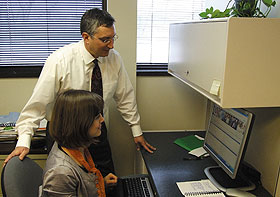  |
| HOME | THIS ISSUE | CALENDAR | GRANTS | BACK ISSUES | < BACK | NEXT > |
Study shows defensive medicine widespread by Kristina Goodnough - February 23, 2009 |
||||
| The cost of ‘defensive’ medicine – tests, procedures, referrals, hospitalizations, or prescriptions ordered by physicians fearful of lawsuits – is huge and widespread, according to a study by the Massachusetts Medical Society and UConn Health Center researcher Robert Aseltine Jr. The study is based on a survey – believed to be the first of its kind – that was completed by more than 900 physicians in Massachusetts. It asked about their use of seven tests and procedures: plain film X-rays, CT scans, magnetic resonance imaging, ultrasounds, laboratory testing, specialty referrals and consultations, and hospital admissions. About 83 percent reported practicing defensive medicine, with an average of between 18 percent and 28 percent of tests, procedures, referrals, and consultations and 13 percent of hospitalizations ordered for defensive reasons. Such practices were estimated to cost a minimum of $1.4 billion per year in Massachusetts. The study, “Investigation of Defensive Medicine in Massachusetts,” is the first to specifically quantify defensive practices across a wide spectrum and among a number of specialties. It also is the first to link defensive practices across a number of medical specialties – anesthesiology, emergency medicine, family medicine, internal medicine, general surgery, neurosurgery, orthopedics, and obstetrics/gynecology – directly with Medicare cost data. The survey, conducted between November 2007 and April 2008, queried physicians in eight specialties: anesthesiology, emergency medicine, family medicine, internal medicine, general surgery, neurosurgery, orthopedics, and obstetrics/gynecology. “Defensive medicine is not only the ordering of medically unnecessary tests, prescriptions, specialist referrals, invasive procedures, and hospital admissions,” says Aseltine, who is director of the Health Center’s Institute for Public Health Research. “It can also be the avoidance of high-risk procedures or even high-risk patients.”
Aseltine says the study is the first to try to quantify the costs of defensive medicine “from the ground up,” by asking physicians about their actual practices. Other studies have tried to determine the cost of defensive medicine by reviewing medical records or by looking at overall health care costs and trying to determine practices that could be classified as defensive. Because defensive medicine is largely “in the eye of the beholder,” Aseltine adds, asking physicians directly about practices taken solely to avoid malpractice claims provides more accurate information. A study published in the New England Journal of Medicine in 2006 analyzed more than 1,400 malpractice claims and found that in almost 40 percent of cases, no medical error was involved. The uncertainty surrounding malpractice claims helps drive the increase in increase testing and other defensive practices. “The fear of being sued that is driving physicians to defensive medicine is dramatically increasing health care costs and threatens the success of health reform efforts,” says Dr. Manish Sethi, a researcher with the Department of Orthopedic Surgery at Massachusetts General Hospital. Sethi is a member of the Medical Society’s Board of Trustees and its Committee on Professional Liability. For the full report on the investigation of defensive medicine in Massachusetts, go to www.massmed.org/defensivemedicine. |
| ADVANCE HOME UCONN HOME |

